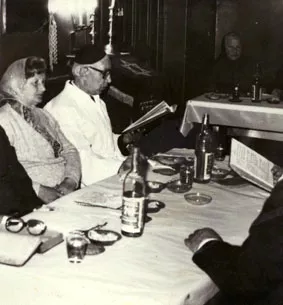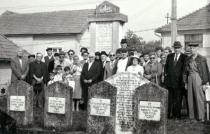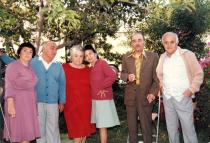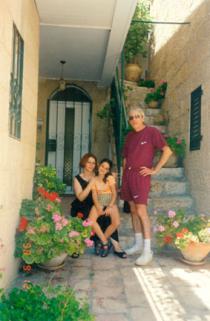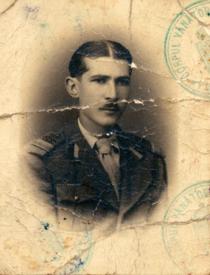This is me Edit Grossmann and my husband Fulop Grossmann in the hall of the synagogue in Des. It must have been Seder or some festival.
We are Orthodox even today. My [daughter's] family in Israel still observes religion rigorously. My sister {Miriam Jakabovits, nee Grossmann] observed it too, well they were exaggeratedly religious. Me as well, I observed kashrut after I got married. And I often think back, perhaps it was a better feeling. Somehow we knew that Friday evening, that Sabbath, it was something, it meant something. Today there is nothing. After the children were born, I kept a kosher household for some ten years more. And I had the poultry cut at the shochet, until we had a shochet, I always had them cut there. Then the shochet died, and it was over. After that I sent to Kolozsvar to have them cut there, approximately until 1970. I never cut poultry at home until then, because I didn't like it, I had a dread of it. But I kept a proper kosher household, I had separate dishes for milk and for meat, even though my husband started to have different principles.
My husband knew many things on Jewry. He could do 'lajnolas' [K'riat HaTorah, reading the Torah] as well. It is a very hard prayer, just a few know it Romania, he knew it. My husband had as much knowledge as a rabbi. He knew everything about the Torah, everything. He came from a very religious family, his father was one of the most religious men in Des. His father didn't come to this synagogue, they had a separate synagogue, a Hasid one. My husband could read from the age of four. He was four years old, and his father took him out from the bed to learn, to read. My husband wasn't Hasid, but he had a great knowledge, since he was a very intelligent man, he could comprehend everything very easily. He attended only the cheder, but he learnt individually. He knew as much as a yeshiva student. Everybody was wondering how he knew so much on Jewry. He was always learning. He knew everything. But these communist ideas came after the war, so he switched [took on from the communist ideas], he didn't observe it [religion] anymore. But he regretted it deeply when he got old. It hurt him a lot that he became estranged. He felt very much annoyed for having left religion. He had his prayer book in his hands the whole after-noon, each day. He realized finally that he belonged to Jewry. Especially when blows hit us, when Erika fell ill, he [my husband] fell ill as well, and it was then that he realized that one shouldn't abandon the Jewish religion, and one shouldn't become estranged from Jewry. He kept on saying that: 'I quitted religion, and blows came. We abandoned the religion, maybe that's why blows are hitting us.' I always said that one shouldn't abandon their faith. Can it be a good or a bad religion, but we were born in it, we have to carry it on.
[In his declining years] He was the soul of the synagogue. He was proficient, he could read everything from the Torah, he knew the explanation for everything, the reason for everything. It was always him who read out from the Torah, who prayed. When he got old, he was always reading and learning at home as well. He had large books; I brought a lot of these to the synagogue, so that if I die, they won't get lost. But I still have a few I don't want to squander. My husband was a very clever man. You have to give it to him. He had a wonderful handwriting, he could bind books marvelously, everything he put his hands on was done, he was so good with his hands. I had a shabby prayer book, he bound it so skillfully. He rebound many of our books, and he rebound the books in the synagogue as well at his old age.
When my husband died, I set shiva, as I did, but not quite as I should have set. Because sitting shiva requires that you have a relative so that you can sit shiva. One has to sit shiva for one week or eight days, and [during this time] somebody has to come to cook, to look after the house. That's the custom. People come and pray at you, in your house, it's about sitting shiva. But since I had no one [relative] left... There wasn't anybody who could have recited a prayer at the funeral, nobody said anything. My son recited the Kaddish, we looked for it in the book, and he recited it. That was all.
